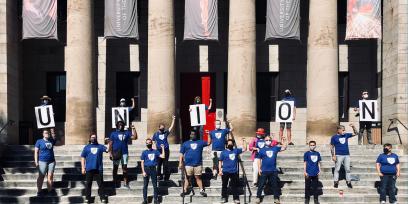It was an especially exciting Labor Day for faculty at the University of the Arts in Philadelphia this year: On Sept. 7 they donned masks and rallied on campus to announce their campaign to form a union.
The new union would represent more than 500 lecturers, adjuncts and full-time faculty and would be associated with United Academics of Philadelphia, a citywide affiliate of the AFT. A supermajority of UArts faculty have already signaled support for the campaign, and they are hoping university administrators will voluntarily recognize the union.
Top issues for faculty are job security, livable wages, health insurance and a voice in university policy—especially as plans for dealing with COVID-19 safety measures move forward.
“Why do I want to win a union for UArts? Stability,” says Beck Gusler, a senior lecturer in the School of Music. “Winning a union at UArts means more stability, granting faculty access to healthcare, not worrying about receiving contracts to teach last-minute, knowing that your class size won’t double without additional compensation. Stability means making a livable wage, not just for the time you spend teaching but also for the time you spend preparing, grading and [performing] all other outside-of-class responsibilities.”
Despite teaching the majority of college classes, adjunct faculty across the nation experience job insecurity and low pay. Because they are hired on an as-needed, contractual basis—a way for universities to save money—they frequently don’t know whether they’ll have any classes to teach from one semester to the next, so their income is unpredictable. When they are assigned classes, the pay is often so low they have to take work at several different colleges and drive from campus to campus to make ends meet. The result is that they worry over income, continuing work and healthcare costs, and have little time to devote to mentoring, campus community-building and other elements that serve their students.
Imani Roach, an adjunct professor who teaches African and African American studies, told the Philadelphia Inquirer that she is teaching five courses across several schools this semester—a situation that keeps her from really immersing herself in the campus community. “It’s really important to support [the students] and the changes they want to see,” she said, referring specifically to student-led antiracism efforts. “It’s important to develop long-standing relationships with them. I think it doesn’t serve them to have people who are in and out, to have people who are overworked teaching their classes.”
The UArts union will also include full-time faculty, who struggle with increasing work loads and low pay as well as a lack of faculty governance opportunities. “In my first year as a full-time faculty member, I was stunned in a committee meeting when I learned that many of my colleagues have been living in fear at UArts because of a sense of powerlessness,” says Chris McDonnell, an assistant professor who teaches animation and art. “Our union is how faculty can find our voice, release this fear, and focus on our mission to advance human creativity.”
By organizing with United Academics of Philadelphia, UArts faculty join faculty at Arcadia University, who affiliated with UAP in 2017, as well as other metro-area faculty who do not yet have unions on their campuses. And they join the AFT, which represents thousands of faculty in the United States.
“The adjunct faculty at UArts—like adjunct and nontenure-track faculty all around this country—work tirelessly to support and educate a generation of students,” says AFT President Randi Weingarten. “As the institutions of higher education continue to navigate their response to the crises we face, it’s imperative their workers have a seat at the table, and a voice in making colleges and universities safe and equitable spaces for everyone who learns and works there.”
[Virginia Myers]


